定计划-简单实用英语翻译
- 格式:docx
- 大小:37.30 KB
- 文档页数:2
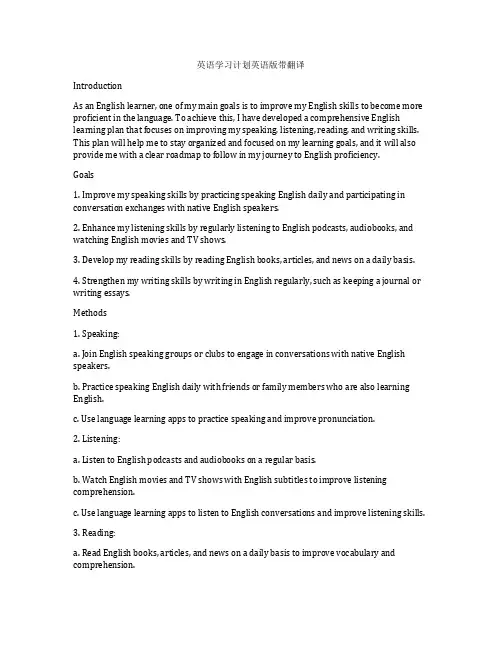
英语学习计划英语版带翻译IntroductionAs an English learner, one of my main goals is to improve my English skills to become more proficient in the language. To achieve this, I have developed a comprehensive English learning plan that focuses on improving my speaking, listening, reading, and writing skills. This plan will help me to stay organized and focused on my learning goals, and it will also provide me with a clear roadmap to follow in my journey to English proficiency.Goals1. Improve my speaking skills by practicing speaking English daily and participating in conversation exchanges with native English speakers.2. Enhance my listening skills by regularly listening to English podcasts, audiobooks, and watching English movies and TV shows.3. Develop my reading skills by reading English books, articles, and news on a daily basis.4. Strengthen my writing skills by writing in English regularly, such as keeping a journal or writing essays.Methods1. Speaking:a. Join English speaking groups or clubs to engage in conversations with native English speakers.b. Practice speaking English daily with friends or family members who are also learning English.c. Use language learning apps to practice speaking and improve pronunciation.2. Listening:a. Listen to English podcasts and audiobooks on a regular basis.b. Watch English movies and TV shows with English subtitles to improve listening comprehension.c. Use language learning apps to listen to English conversations and improve listening skills.3. Reading:a. Read English books, articles, and news on a daily basis to improve vocabulary and comprehension.b. Join English book clubs or reading groups to discuss English literature and improve reading skills.c. Use language learning apps to access English reading materials and track progress.4. Writing:a. Keep a journal in English to practice writing skills and record daily thoughts and experiences.b. Write essays on various topics in English to improve writing fluency and expression.c. Use language learning apps to receive feedback on written assignments and improve writing skills.ScheduleMy English learning plan will be divided into a weekly schedule that includes specific activities for each skill area. This schedule will help me to stay organized and focused on my learning goals, and it will also provide me with a clear roadmap to follow in my journey to English proficiency.Monday:- Speaking: Join an English speaking group or club and engage in conversations with native English speakers.- Listening: Listen to an English podcast or audiobook for 30 minutes.- Reading: Read an English article or news piece for 30 minutes.- Writing: Write a journal entry in English about the day's activities.Tuesday:- Speaking: Practice speaking English with a friend or family member for 30 minutes.- Listening: Watch an English movie or TV show with English subtitles for 1 hour.- Reading: Read a chapter of an English book for 30 minutes.- Writing: Write an essay in English on a chosen topic.Wednesday:- Speaking: Use a language learning app to practice speaking and improve pronunciation for 30 minutes.- Listening: Listen to an English podcast or audiobook for 30 minutes.- Reading: Read an English article or news piece for 30 minutes.- Writing: Write a journal entry in English about the day's activities.Thursday:- Speaking: Join an English speaking group or club and engage in conversations with native English speakers.- Listening: Watch an English movie or TV show with English subtitles for 1 hour.- Reading: Read a chapter of an English book for 30 minutes.- Writing: Write an essay in English on a chosen topic.Friday:- Speaking: Practice speaking English with a friend or family member for 30 minutes.- Listening: Listen to an English podcast or audiobook for 30 minutes.- Reading: Read an English article or news piece for 30 minutes.- Writing: Write a journal entry in English about the day's activities.Saturday:- Speaking: Use a language learning app to practice speaking and improve pronunciation for 30 minutes.- Listening: Listen to an English podcast or audiobook for 30 minutes.- Reading: Read a chapter of an English book for 30 minutes.- Writing: Write an essay in English on a chosen topic.Sunday:- Speaking: Practice speaking English with a friend or family member for 30 minutes.- Listening: Watch an English movie or TV show with English subtitles for 1 hour.- Reading: Read an English article or news piece for 30 minutes.- Writing: Write a journal entry in English about the day's activities.Progress TrackingTo track my progress, I will use a journal to record my daily activities related to speaking, listening, reading, and writing in English. Additionally, I will utilize language learning apps that provide progress tracking and feedback on my language skills. By keeping track of myprogress, I will be able to identify areas for improvement and adjust my learning plan accordingly.ConclusionIn conclusion, my English learning plan is designed to help me improve my English skills in speaking, listening, reading, and writing. By implementing specific methods and following a weekly schedule, I am confident that I will make significant progress in my English language proficiency. I am committed to staying focused and dedicated to my English learning plan in order to achieve my goals and become a fluent English speaker.(Word count: 847 words)我的英语学习计划介绍作为一名英语学习者,我的主要目标之一是提高自己的英语技能,以便更加熟练地掌握这门语言。
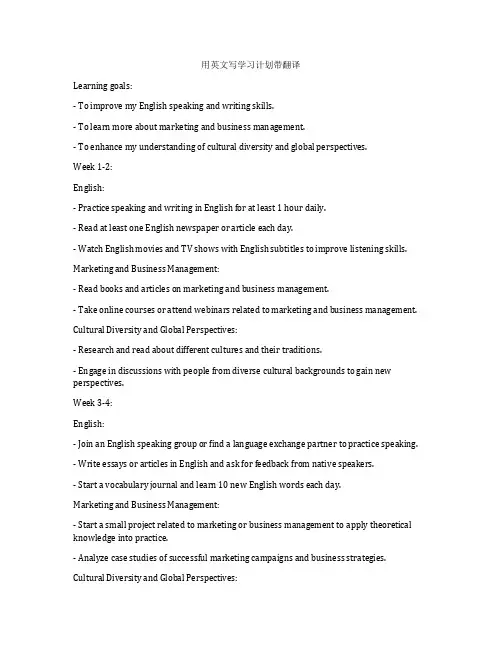
用英文写学习计划带翻译Learning goals:- To improve my English speaking and writing skills.- To learn more about marketing and business management.- To enhance my understanding of cultural diversity and global perspectives.Week 1-2:English:- Practice speaking and writing in English for at least 1 hour daily.- Read at least one English newspaper or article each day.- Watch English movies and TV shows with English subtitles to improve listening skills. Marketing and Business Management:- Read books and articles on marketing and business management.- Take online courses or attend webinars related to marketing and business management. Cultural Diversity and Global Perspectives:- Research and read about different cultures and their traditions.- Engage in discussions with people from diverse cultural backgrounds to gain new perspectives.Week 3-4:English:- Join an English speaking group or find a language exchange partner to practice speaking. - Write essays or articles in English and ask for feedback from native speakers.- Start a vocabulary journal and learn 10 new English words each day.Marketing and Business Management:- Start a small project related to marketing or business management to apply theoretical knowledge into practice.- Analyze case studies of successful marketing campaigns and business strategies. Cultural Diversity and Global Perspectives:- Attend cultural events or festivals to experience different traditions and customs firsthand. - Volunteer or participate in activities that promote cultural understanding and diversity. Week 5-6:English:- Take language proficiency tests to assess improvement in speaking and writing skills.- Keep a diary in English to track progress and reflect on language learning experience. Marketing and Business Management:- Research and write a report on a current trend or challenge in the marketing or business management industry.Cultural Diversity and Global Perspectives:- Write a reflective essay on personal experiences and learnings related to cultural diversity and global perspectives.Month 2-3:English:- Focus on improving pronunciation and intonation by practicing speaking with a language coach or tutor.- Write a research paper on a topic of interest in English.Marketing and Business Management:- Attend workshops or seminars on the latest trends and developments in marketing and business management.Cultural Diversity and Global Perspectives:- Participate in cultural exchange programs or travel to different countries to immerse in diverse cultures.Month 3-6:English:- Start a blog or vlog in English to share personal experiences and insights.- Connect with native English speakers through social media or language exchange platforms to maintain language skills.Marketing and Business Management:- Intern or take on a part-time job in a marketing or business management role to gain practical experience.Cultural Diversity and Global Perspectives:- Plan and organize a cultural awareness event or initiative in the local community. Overall, this study plan aims to achieve a comprehensive development of language skills, professional knowledge, and cultural understanding over the span of six months.学习计划学习目标:- 提高英语口语和写作水平。
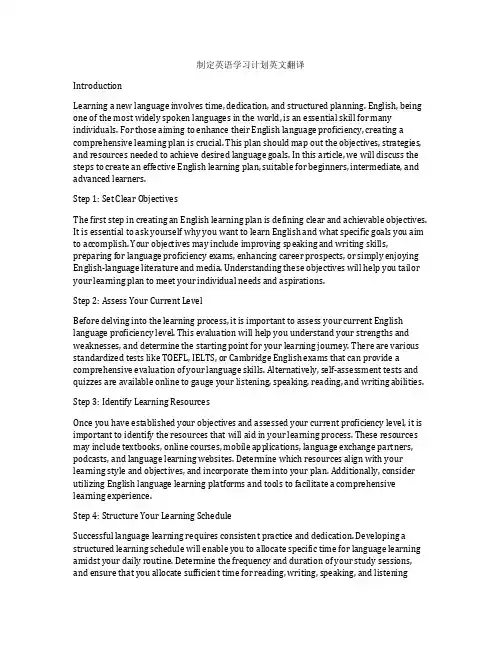
制定英语学习计划英文翻译IntroductionLearning a new language involves time, dedication, and structured planning. English, being one of the most widely spoken languages in the world, is an essential skill for many individuals. For those aiming to enhance their English language proficiency, creating a comprehensive learning plan is crucial. This plan should map out the objectives, strategies, and resources needed to achieve desired language goals. In this article, we will discuss the steps to create an effective English learning plan, suitable for beginners, intermediate, and advanced learners.Step 1: Set Clear ObjectivesThe first step in creating an English learning plan is defining clear and achievable objectives. It is essential to ask yourself why you want to learn English and what specific goals you aim to accomplish. Your objectives may include improving speaking and writing skills, preparing for language proficiency exams, enhancing career prospects, or simply enjoying English-language literature and media. Understanding these objectives will help you tailor your learning plan to meet your individual needs and aspirations.Step 2: Assess Your Current LevelBefore delving into the learning process, it is important to assess your current English language proficiency level. This evaluation will help you understand your strengths and weaknesses, and determine the starting point for your learning journey. There are various standardized tests like TOEFL, IELTS, or Cambridge English exams that can provide a comprehensive evaluation of your language skills. Alternatively, self-assessment tests and quizzes are available online to gauge your listening, speaking, reading, and writing abilities.Step 3: Identify Learning ResourcesOnce you have established your objectives and assessed your current proficiency level, it is important to identify the resources that will aid in your learning process. These resources may include textbooks, online courses, mobile applications, language exchange partners, podcasts, and language learning websites. Determine which resources align with your learning style and objectives, and incorporate them into your plan. Additionally, consider utilizing English language learning platforms and tools to facilitate a comprehensive learning experience.Step 4: Structure Your Learning ScheduleSuccessful language learning requires consistent practice and dedication. Developing a structured learning schedule will enable you to allocate specific time for language learning amidst your daily routine. Determine the frequency and duration of your study sessions, and ensure that you allocate sufficient time for reading, writing, speaking, and listeningpractice. Furthermore, consider incorporating language learning activities into your everyday life, such as labeling objects in English, listening to English music, or watching English-language films and series.Step 5: Engage in Language PracticePractice is fundamental in language acquisition and proficiency. Engaging in regular language practice activities will enhance your skills and confidence in using English. This may involve conversing with native English speakers, participating in language exchange programs, joining English-speaking clubs or communities, or practicing with fellow learners. Additionally, consider keeping a language journal, engaging in writing prompts, or participating in online language forums to strengthen your writing skills.Step 6: Monitor Your ProgressMonitoring your progress is vital in ensuring the effectiveness of your learning plan. Regularly assess your advancements in reading, writing, speaking, and listening through self-evaluations, practice tests, or language proficiency assessments. Tracking your progress will help identify areas that require improvement, allowing you to modify and adjust your learning plan accordingly. Additionally, seeking feedback from language instructors, tutors, or mentors can provide valuable insights into your language development.Step 7: Seek Language Immersion OpportunitiesLanguage immersion is an effective way to enhance language skills and cultural understanding. If possible, consider seeking language immersion opportunities, such as studying abroad in an English-speaking country, participating in language immersion programs, or engaging in cultural exchange experiences. Immersing yourself in an English-speaking environment will provide authentic language exposure and opportunities for real-life language practice.ConclusionDeveloping an effective English learning plan requires dedication, commitment, and a structured approach. By setting clear objectives, assessing your proficiency level, identifying resources, structuring your learning schedule, engaging in language practice, monitoring your progress, and seeking language immersion opportunities, you can create a comprehensive and tailored plan for advancing your English language skills. Remember, language learning is a dynamic and continuous process, and your plan should be adaptable to accommodate changing needs and goals. With a well-structured learning plan, combined with consistent practice and dedication, you can achieve fluency and proficiency in the English language.。
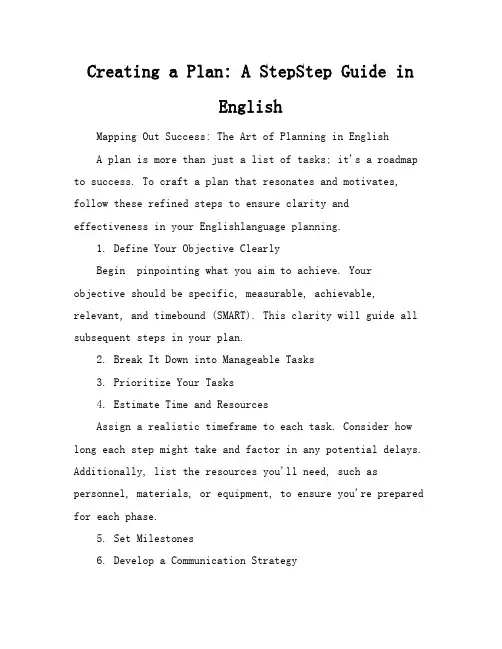
Creating a Plan: A StepStep Guide inEnglishMapping Out Success: The Art of Planning in EnglishA plan is more than just a list of tasks; it's a roadmap to success. To craft a plan that resonates and motivates, follow these refined steps to ensure clarity and effectiveness in your Englishlanguage planning.1. Define Your Objective ClearlyBegin pinpointing what you aim to achieve. Yourobjective should be specific, measurable, achievable, relevant, and timebound (SMART). This clarity will guide all subsequent steps in your plan.2. Break It Down into Manageable Tasks3. Prioritize Your Tasks4. Estimate Time and ResourcesAssign a realistic timeframe to each task. Consider how long each step might take and factor in any potential delays. Additionally, list the resources you'll need, such as personnel, materials, or equipment, to ensure you're prepared for each phase.5. Set Milestones6. Develop a Communication Strategy7. Review and RevisePlans are not set in stone; they are living documents that may need to be revised. Schedule regular reviews to assess your progress and make necessary adjustments. Be prepared to pivot if unexpected challenges arise.By following these steps, you'll create a robust plan that not only outlines your path to success but also adapts to the journey's twists and turns. Remember, the art of planning is about flexibility and foresight, not rigidity. Your plan should serve as a guiding light, not a straightjacket.8. Cultivate a Supportive Environment9. Embrace AccountabilityAccountability is the backbone of a solid plan. Ensure that each person involved understands their role and the importance of their contributions. Implement a system for regular updates and feedback, which keeps everyone on track and accountable for their actions.10. Anticipate and Mitigate RisksNo plan is without its potential pitfalls. Identify potential risks early on and develop strategies to mitigate them. This proactive approach can save valuable time and resources in the long run. Be prepared to have contingency plans for the most critical risks.11. Celebrate Small Wins12. Document Lessons LearnedThroughout the execution of your plan, there will be lessons to be learned—both successes and failures. Document these insights for future reference. This practice not only helps refine current plans but also informs better planning for future endeavors.13. Reflect and ImproveOnce your plan has been fully executed, take the time to reflect on the entire process. What worked well? What could be improved? Reflection is a crucial step in personal and professional growth. Use these insights to refine your planning skills for the next challenge.14. Share Your Success StoryBy embracing these additional steps, your plan will not only be wellstructured and effective but will also be a testament to the power of thoughtful preparation and continuous improvement. Remember, a plan is not just a means to an end; it's a journey that can teach us as much about ourselves as it does about our goals.。
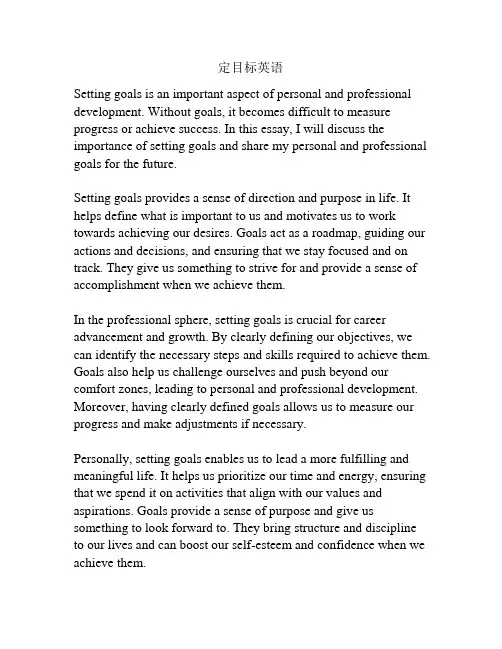
定目标英语Setting goals is an important aspect of personal and professional development. Without goals, it becomes difficult to measure progress or achieve success. In this essay, I will discuss the importance of setting goals and share my personal and professional goals for the future.Setting goals provides a sense of direction and purpose in life. It helps define what is important to us and motivates us to work towards achieving our desires. Goals act as a roadmap, guiding our actions and decisions, and ensuring that we stay focused and on track. They give us something to strive for and provide a sense of accomplishment when we achieve them.In the professional sphere, setting goals is crucial for career advancement and growth. By clearly defining our objectives, we can identify the necessary steps and skills required to achieve them. Goals also help us challenge ourselves and push beyond our comfort zones, leading to personal and professional development. Moreover, having clearly defined goals allows us to measure our progress and make adjustments if necessary.Personally, setting goals enables us to lead a more fulfilling and meaningful life. It helps us prioritize our time and energy, ensuring that we spend it on activities that align with our values and aspirations. Goals provide a sense of purpose and give us something to look forward to. They bring structure and discipline to our lives and can boost our self-esteem and confidence when we achieve them.In terms of my personal and professional goals, I have several that I am currently working towards. In my professional life, I aim to advance in my career and take on more leadership roles. I plan to acquire additional skills and knowledge through professional development courses and workshops, which will enable me to qualify for promotions and take on more responsibilities. Furthermore, I aspire to make a positive impact in my field and contribute to the growth and development of my organization.On a personal level, I strive to maintain a healthy work-life balance.I believe in the importance of taking care of my physical and mental well-being, and I make it a priority to exercise regularly, eat a balanced diet, and practice mindfulness and self-care. Additionally, I aim to nurture my personal relationships and spend quality time with my family and friends.In conclusion, setting goals is a crucial aspect of personal and professional development. It provides a sense of direction, purpose, and motivation. Goals assist in measuring progress and achieving success, both personally and professionally. By setting clear, achievable goals, we can lead a more fulfilling and productive life.。
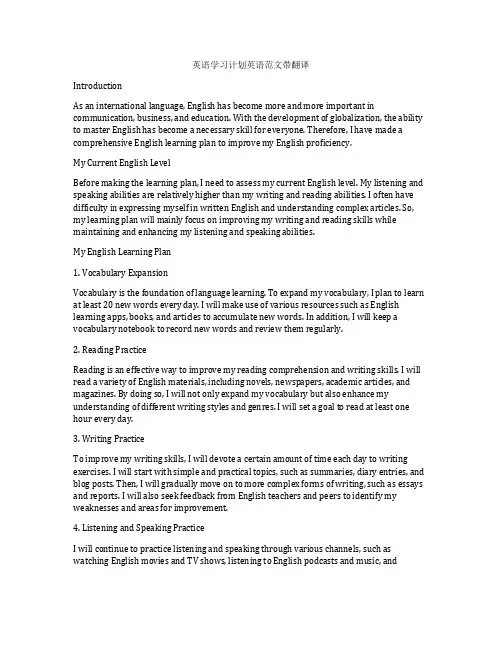
英语学习计划英语范文带翻译IntroductionAs an international language, English has become more and more important in communication, business, and education. With the development of globalization, the ability to master English has become a necessary skill for everyone. Therefore, I have made a comprehensive English learning plan to improve my English proficiency.My Current English LevelBefore making the learning plan, I need to assess my current English level. My listening and speaking abilities are relatively higher than my writing and reading abilities. I often have difficulty in expressing myself in written English and understanding complex articles. So, my learning plan will mainly focus on improving my writing and reading skills while maintaining and enhancing my listening and speaking abilities.My English Learning Plan1. Vocabulary ExpansionVocabulary is the foundation of language learning. To expand my vocabulary, I plan to learn at least 20 new words every day. I will make use of various resources such as English learning apps, books, and articles to accumulate new words. In addition, I will keep a vocabulary notebook to record new words and review them regularly.2. Reading PracticeReading is an effective way to improve my reading comprehension and writing skills. I will read a variety of English materials, including novels, newspapers, academic articles, and magazines. By doing so, I will not only expand my vocabulary but also enhance my understanding of different writing styles and genres. I will set a goal to read at least one hour every day.3. Writing PracticeTo improve my writing skills, I will devote a certain amount of time each day to writing exercises. I will start with simple and practical topics, such as summaries, diary entries, and blog posts. Then, I will gradually move on to more complex forms of writing, such as essays and reports. I will also seek feedback from English teachers and peers to identify my weaknesses and areas for improvement.4. Listening and Speaking PracticeI will continue to practice listening and speaking through various channels, such as watching English movies and TV shows, listening to English podcasts and music, andengaging in conversations with native English speakers. I will also pay attention to pronunciation and intonation to achieve more natural and fluent speaking.5. Grammar and Sentence StructureTo enhance my writing and speaking skills, I will review and consolidate grammar rules and sentence structures on a regular basis. I will use grammar books and online resources to better understand the principles of English grammar and apply them accurately in my writing and speaking.6. Language Exchange and CommunicationI will actively participate in language exchange activities and online forums to communicate with native English speakers and other English learners. By doing so, I will have more opportunities to practice using English in real-life situations and receive constructive feedback from others.7. Regular Self-assessmentI will set specific and achievable learning goals for each month and evaluate my progress regularly. By reflecting on my strengths and weaknesses, I will adjust my learning plan accordingly to ensure continuous improvement.ConclusionIn conclusion, improving my English skills requires consistent effort and dedication. By following this comprehensive learning plan, I am confident that I will be able to elevate my English proficiency to a higher level. I am looking forward to seeing the progress and the positive impact it will bring to my personal and professional life.中文翻译我的英语学习计划导言作为一门国际语言,英语在交流、商务和教育中变得越来越重要。
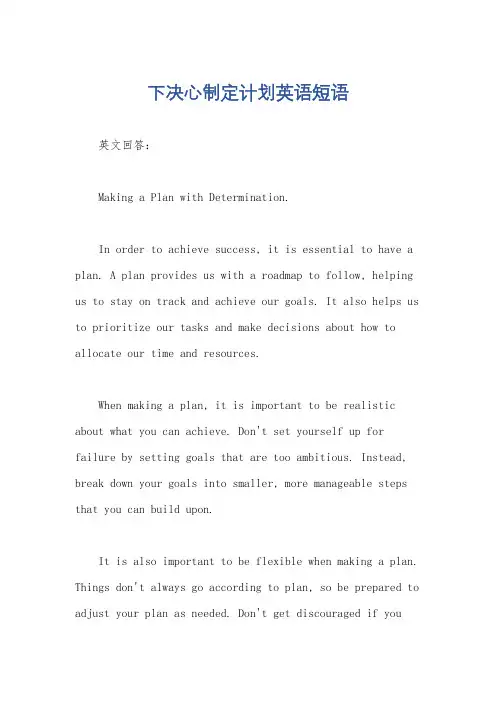
下决心制定计划英语短语英文回答:Making a Plan with Determination.In order to achieve success, it is essential to have a plan. A plan provides us with a roadmap to follow, helping us to stay on track and achieve our goals. It also helps us to prioritize our tasks and make decisions about how to allocate our time and resources.When making a plan, it is important to be realistic about what you can achieve. Don't set yourself up for failure by setting goals that are too ambitious. Instead, break down your goals into smaller, more manageable steps that you can build upon.It is also important to be flexible when making a plan. Things don't always go according to plan, so be prepared to adjust your plan as needed. Don't get discouraged if youencounter setbacks. Instead, learn from your mistakes and keep moving forward.Finally, it is important to have determination when making a plan. Determination is the quality that allows usto persist in the face of challenges. When we are determined, we are more likely to achieve our goals.中文回答:下决心制定计划。

制定计划英语四级作文模板Title: Formulating a Plan for English CET-4。
Introduction。
The English CET-4 exam is an important milestone for many students in China. It is a standardized test that assesses the English proficiency of non-English majors in Chinese universities. In order to pass the exam, students need to have a solid understanding of English grammar, vocabulary, reading comprehension, and writing skills. Formulating a plan to prepare for the CET-4 exam is crucial for success.Setting Goals。
The first step in formulating a plan for the CET-4 exam is to set clear and achievable goals. Students should consider their current level of English proficiency and the score they need to pass the exam. It is important to setboth short-term and long-term goals to track progress and stay motivated throughout the preparation process.Assessing Strengths and Weaknesses。
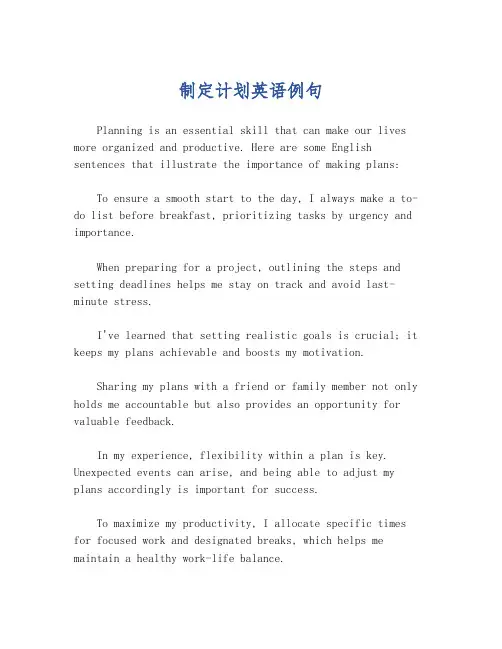
制定计划英语例句Planning is an essential skill that can make our lives more organized and productive. Here are some English sentences that illustrate the importance of making plans:To ensure a smooth start to the day, I always make a to-do list before breakfast, prioritizing tasks by urgency and importance.When preparing for a project, outlining the steps and setting deadlines helps me stay on track and avoid last-minute stress.I've learned that setting realistic goals is crucial; it keeps my plans achievable and boosts my motivation.Sharing my plans with a friend or family member not only holds me accountable but also provides an opportunity for valuable feedback.In my experience, flexibility within a plan is key. Unexpected events can arise, and being able to adjust my plans accordingly is important for success.To maximize my productivity, I allocate specific times for focused work and designated breaks, which helps me maintain a healthy work-life balance.Reflecting on past plans and their outcomes is a valuable exercise in understanding what works and what doesn't,allowing me to refine my planning process.For long-term goals, breaking them down into smaller, manageable tasks makes them less daunting and more achievable.In conclusion, effective planning is a dynamic processthat requires organization, flexibility, and reflection to adapt and improve over time.。
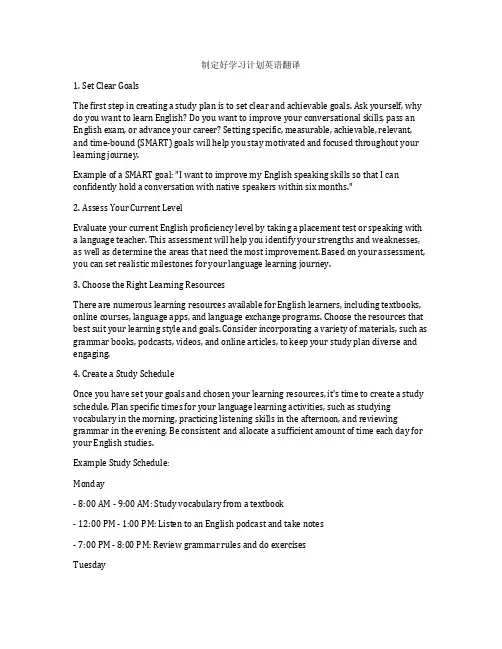
制定好学习计划英语翻译1. Set Clear GoalsThe first step in creating a study plan is to set clear and achievable goals. Ask yourself, why do you want to learn English? Do you want to improve your conversational skills, pass an English exam, or advance your career? Setting specific, measurable, achievable, relevant, and time-bound (SMART) goals will help you stay motivated and focused throughout your learning journey.Example of a SMART goal: "I want to improve my English speaking skills so that I can confidently hold a conversation with native speakers within six months."2. Assess Your Current LevelEvaluate your current English proficiency level by taking a placement test or speaking with a language teacher. This assessment will help you identify your strengths and weaknesses, as well as determine the areas that need the most improvement. Based on your assessment, you can set realistic milestones for your language learning journey.3. Choose the Right Learning ResourcesThere are numerous learning resources available for English learners, including textbooks, online courses, language apps, and language exchange programs. Choose the resources that best suit your learning style and goals. Consider incorporating a variety of materials, such as grammar books, podcasts, videos, and online articles, to keep your study plan diverse and engaging.4. Create a Study ScheduleOnce you have set your goals and chosen your learning resources, it's time to create a study schedule. Plan specific times for your language learning activities, such as studying vocabulary in the morning, practicing listening skills in the afternoon, and reviewing grammar in the evening. Be consistent and allocate a sufficient amount of time each day for your English studies.Example Study Schedule:Monday- 8:00 AM - 9:00 AM: Study vocabulary from a textbook- 12:00 PM - 1:00 PM: Listen to an English podcast and take notes- 7:00 PM - 8:00 PM: Review grammar rules and do exercisesTuesday- 8:00 AM - 9:00 AM: Practice speaking with a language exchange partner- 12:00 PM - 1:00 PM: Watch an English movie with subtitles- 7:00 PM - 8:00 PM: Work on a writing assignment or journal in English5. Set Specific Learning ActivitiesIncorporate a variety of learning activities into your study plan to cater to different language skills. Include activities for practicing speaking, listening, reading, writing, and grammar. For example:- Speaking: Engage in conversations with native speakers, participate in language exchange programs, or practice pronunciation with language learning apps.- Listening: Listen to English podcasts, watch videos, and movies in English, and transcribe spoken texts to improve listening comprehension.- Reading: Read English books, newspapers, and articles on topics that interest you. Keep a vocabulary journal to jot down new words and phrases.- Writing: Practice writing short essays, emails, or journal entries in English. Seek feedback from a language tutor or native speakers to improve your writing skills.- Grammar: Set aside time to review grammar rules and do exercises to reinforce your understanding of English grammar.6. Measure Your ProgressRegularly assess your progress by tracking your learning activities and evaluating your language skills. Use language proficiency tests, self-assessment quizzes, or language learning apps to measure your improvement in vocabulary, grammar, speaking, listening, and writing. Reflect on your achievements and areas that need more attention, and adjust your study plan accordingly.7. Seek Support and FeedbackSeek support from language teachers, language exchange partners, and fellow learners to keep yourself motivated and accountable. Join language learning communities, attend language meetups, or take language classes to immerse yourself in a language-rich environment. Additionally, ask for feedback from native speakers or language tutors to improve your language skills.8. Adjust and Adapt Your PlanAs you progress in your language learning journey, you may encounter new challenges or opportunities that require adjustments to your study plan. Be flexible and adapt your planto accommodate changes in your schedule, learning pace, or language learning goals. Regularly review and refine your study plan to ensure that it remains relevant and effective. In conclusion, developing a well-structured study plan for learning English is crucial for success. By setting clear goals, assessing your current level, choosing the right resources, creating a study schedule, setting specific learning activities, measuring your progress, seeking support and feedback, and adjusting your plan as needed, you can effectively improve your English language skills. With a well-designed study plan, commitment, and consistency, you will be well on your way to achieving your language learning goals. Good luck!。
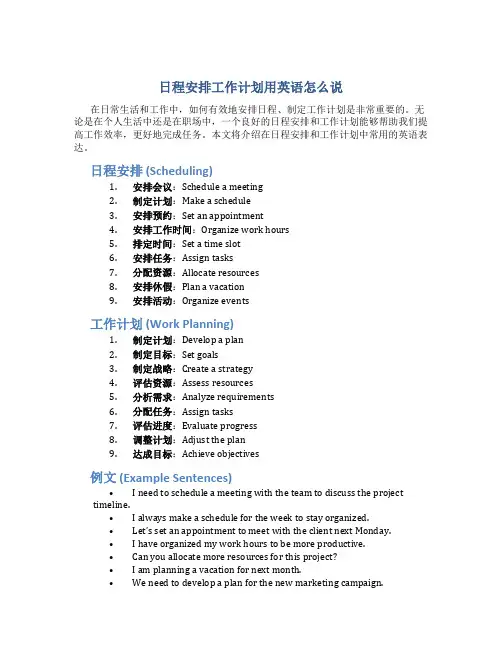
日程安排工作计划用英语怎么说在日常生活和工作中,如何有效地安排日程、制定工作计划是非常重要的。
无论是在个人生活中还是在职场中,一个良好的日程安排和工作计划能够帮助我们提高工作效率,更好地完成任务。
本文将介绍在日程安排和工作计划中常用的英语表达。
日程安排 (Scheduling)1.安排会议:Schedule a meeting2.制定计划:Make a schedule3.安排预约:Set an appointment4.安排工作时间:Organize work hours5.排定时间:Set a time slot6.安排任务:Assign tasks7.分配资源:Allocate resources8.安排休假:Plan a vacation9.安排活动:Organize events工作计划 (Work Planning)1.制定计划:Develop a plan2.制定目标:Set goals3.制定战略:Create a strategy4.评估资源:Assess resources5.分析需求:Analyze requirements6.分配任务:Assign tasks7.评估进度:Evaluate progress8.调整计划:Adjust the plan9.达成目标:Achieve objectives例文 (Example Sentences)•I need to schedule a meeting with the team to discuss the project timeline.•I always make a schedule for the week to stay organized.•Let’s set an appointment to meet with the client next Monday.•I have organized my work hours to be more productive.•Can you allocate more resources for this project?•I am planning a vacation for next month.•We need to develop a plan for the new marketing campaign.•Setting goals is essential for achieving success.•Let’s create a strategy to improve sales performance.•We should assess the resources before starting the project.在日程安排和工作计划中使用正确的英语表达能够帮助我们更清晰地理解和表达自己的计划,使工作更加高效和有条理。
计划与愿望有关的英语单词1. Plan (n./v.) - 计划;规划- Plans (pl.) - 计划(复数形式)- Planning (n./v.) - 规划过程;制定计划- Schedule (n./v.) - 时间表;安排- Scheme (n.) - 方案;计划- Blueprint (n.) - 蓝图;规划方案- Strategy (n.) - 战略;策略计划- Agenda (n.) - 议程;工作计划- To intend (v.) - 打算;意图- Intention (n.) - 目的;意图- Goal (n.) - 目标- Objective (n.) - 目标;目的- T arget (n.) - 目标- Aspiration (n.) - 志向;抱负- Ambition (n.) - 雄心;野心- Dream (n.) - 梦想- Vision (n.) - 远景;设想- Wishlist (n.) - 愿望清单- Hope (n./v.) - 希望- Wish (n./v.) - 愿望;希望- Look forward to (phr.v.) - 期待;盼望- Future plans (n.phr.) - 未来计划- Long-term goals (n.phr.) - 长期目标- Short-term objectives (n.phr.) - 短期目标此外,还有一些用于描述计划和愿望的动词短语:- Set a goal - 设定目标- Make a plan - 制定计划- Pursue one's dreams - 追求梦想- Fulfill a wish - 实现愿望- Work towards something - 朝着某事努力- Devise a strategy - 制定战略- Chart a course - 制定路线图。
英语作文暑假计划及翻译Summer Vacation Plan。
Summer vacation is just around the corner, and I have already made a detailed plan for the upcoming summer break.I believe that a well-organized plan will help me make the most of my time off and ensure that I have a fun and fulfilling summer.First and foremost, I plan to travel to several different places during the summer break. I have always loved exploring new cities and experiencing different cultures, so I have decided to visit some of the most famous tourist destinations in the world. I will start my journey by visiting Paris, the city of love and lights. I can't wait to see the Eiffel Tower, walk along the Champs-Élysées, and enjoy a delicious croissant in a cute little café. After Paris, I will head to Rome to marvel at the ancient ruins of the Colosseum and the Roman Forum. I also plan to visit the Vatican City and see the stunning SistineChapel. Finally, I will end my trip with a visit to Tokyo, where I will explore the bustling streets of Shibuya, visit the historic temples in Asakusa, and indulge in some delicious sushi.In addition to traveling, I also plan to spend some time relaxing and rejuvenating during the summer break. I will make sure to take care of my physical and mental well-being by practicing yoga, going for long walks in nature, and meditating regularly. I believe that taking care of myself is essential for my overall happiness and success, so I will prioritize self-care during the summer break.Furthermore, I plan to spend quality time with my family and friends during the summer break. I will organize barbecues, picnics, and beach days to create lasting memories with the people I love. I will also make an effort to strengthen my relationships by having meaningful conversations, sharing laughter, and showing my appreciation for the important people in my life.Lastly, I plan to dedicate some time to personal growthand development during the summer break. I will read books on topics that interest me, take online courses to learn new skills, and work on personal projects that I am passionate about. I believe that continuous learning and growth are essential for my personal and professional development, so I will make an effort to expand my knowledge and skills during the summer break.In conclusion, I am very excited about my summer vacation plan and I can't wait to embark on this exciting journey. I believe that by traveling, relaxing, spending time with loved ones, and focusing on personal growth, I will have a fun and fulfilling summer break that will leave me feeling refreshed and inspired for the upcoming school year. I am confident that this summer will be one to remember!夏季假期计划。
计划英语怎么说计划在英语中是plan。
计划作为一个词,从字面意义上来看,是指对某件事情的预想和安排。
在日常生活中,我们都需要进行计划,无论是工作还是生活。
因此,掌握英语中的计划相关词汇和表达方式,对我们的学习和工作都非常重要。
一、计划的相关词汇1. Schedule /ˈʃedjuːl/ 日程表例如:I'm trying to work out my schedule for next week. 我在尝试规划下周的日程。
2. Agenda /əˈdʒendə/ 议程例如:The first item on the agenda is the budget report. 议程上的第一项是预算报告。
3. Scheme /skiːm/ 计划,方案例如:She came up with a scheme to increase sales. 她想出了一个增加销售的方案。
4. Blueprint /ˈbluːprɪnt/ 蓝图例如:We need to develop a blueprint for therenovation of the building. 我们需要制定建筑物翻新的蓝图。
5. Program /ˈprəʊɡræm/ 计划,项目例如:Our company has launched a new training program for employees. 我们公司为员工推出了一项新的培训计划。
二、表达计划的方式1. I am planning to… 我计划…例如:I am planning to take a vacation next month. 我计划下个月去度假。
2. My plan is to… 我的计划是…例如:My plan is to finish this project by the end of the week. 我的计划是本周结束这个项目。
定计划-简单实用英语翻译
451. What do you plan to do tomorrow?
明天你打算做什么?
452. I doubt that I'll do anything tomorrow.
明天我恐怕什么也不做。
453. Please excuse me for a little while. I want to do something.
对不起,请稍等一会儿,我要办点事。
454. I imagine I'll do some work instead of going to the movies.
我想干点活,不去看电影了。
455. Will it be convenient for you to explain your plans to him?
你把你的计划向他讲一下,方便吗?
456. There's nothing to do because tomorrow is a holiday.
明天是假日所以没事可做。
457. What's your brother planning to do tomorrow?
你的兄弟明天打算做什么?
458. He can't decide what to do.
他决定不了要干什么。
459. It's difficult to make a decision without knowing all the facts.
不了解全部事实,很难作决定。
460. We're trying to plan our future.
我们正点想法替将来作打算。
461. That's a good idea.
那是个好主意。
462. I'm hoping to spend a few days in the mountains.
我希望在山区住几天。
463. Would you consider going north this summer?
今年夏天你考虑到北方去吗?
464. If there's a chance you'll go, I'd like to go with you.
如果你有机会去,我想和你一起去。
465. After you think it over, please let me know what you decide.
等你想好了,请把你的决定告诉我。